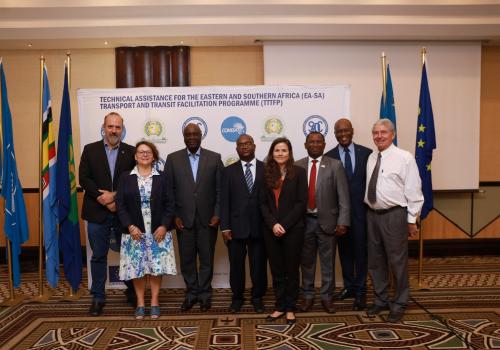The Information Communication Technology (ICT) gateway to host the Transport Registers and Information System (TRIPS) and the Corridor Trip Monitoring System (CTMS) was officially launched in Windhoek, Namibia, on 28th February 2023.
TRIPS and CTMS are being implemented by COMESA, EAC and SADC through the Tripartite Transport and Transit Facilitation Programme (TTTFP) funded by the EU to the tune of €18 million, as well as the pilot implementation of CTMS co-funded by the EU and the German Government. The overall objective of the TTTFP is to facilitate the development of a more competitive, integrated, and liberalised regional road transport market in the Tripartite Region to support the implementation of the Tripartite Free Trade Agreement (TFTA) and the African Continental Free Trade Agreement (AfCFTA).
The CTMS is a regional electronic transport tracking and monitoring tool for the Tripartite Member/Partner States of the Common Market for Eastern and Southern Africa (COMESA), East African Community (EAC) and Southern African Development Community (SADC). CTMS is geared at tracking the driver and vehicle to monitor compliance with the agreed hormonised transport requirements, regulations and laws along the corridors between Eastern and Southern African Region.
The CTMS seeks to reduce the travelling and transit times for persons and goods throughout the region in support of accelerated development and growth. This facilitates the implementation of SMART Corridors by re-engineering border operations and procedures with the digitalisation of border protocols and exchange of documents in an electronic format between the cross-border transport operators, travellers, and border agencies.
To achieve this, the Tripartite developed TRIPS which is a gateway or switch that interconnects National Transport Information Systems to improve information sharing and verification of transit documents, licences, permits and vehicle and driver particulars between the 25 African mainland states of COMESA, EAC and SADC.
Speaking at the launch, Director of Transport, Policy and Regulation in the Ministry of Works and Transport of Namibia, Dr. Cedric Limbo, said the implementation of TRIPS and CTMS will facilitate trade and transport and promote regional integration in pursuit of strategic objectives of the continental free trade.
Addressing delegates on behalf of the Secretary General and Chairperson of the Tripartite Task Force of COMESA-EAC-SADC, Mr. Bernard Dzawanda, said the imminent implementation of TRIPS and CTMS on the Trans Kalahari Corridor will spearhead the harmonisation of cross border road transport to facilitate smooth movement of goods and people.
“The Tripartite Free Trade Area (TFTA) is one of the building blocks for the African Continental Free Trade Area (AfCFTA) and the milestone to successfully host the TRIPS and CTMS as a joint ICT Infrastructure under the Tripartite is an important contribution towards the realisation of the ‘Africa we want’ in accordance with Agenda 2063 spearheaded by the African Union,” he said.
The Chief Executive Officer of the Namibian Roads Authority, Mr Conrad Lutombi, assured all Member and Partner States of the Tripartite that the Roads Authority and Namibia has the required capacity, experience, world-class information communication infrastructure and expertise required to host the Tripartite Systems. The Roads Authority has accepted the Concept Note setting out the envisaged TTTFP implementation on selected corridors, commencing with a phased implementation on the Trans Kalahari Corridor (TKC) during March 2023.
Deputy Head of the European Union Delegation to Namibia, Mrs. Gosia Lachut, said the CTMS was initially developed for safe transport and trade facilitation during the COVID-19 pandemic and will become an essential tool to improve the efficiency of transport corridors in Africa when it is integrated with other systems deployed at border posts such as Customs and Immigration Systems.
She said the achievements of the TTTFP, through which CTMS and TRIPS are being implemented, have motivated the EU to focus on enhancing trade and transport links along 11 strategic corridors in Africa. In Southern Africa, the EU will support the North-South Corridor and the Walvis Bay-Gaborone-Maputo Inter-Oceanic Corridor as part of the Global Gateway which stands for sustainable and trusted connections that work for people and the planet.
The representative of the German Development Cooperation (GIZ), Mrs. Danièle Stübi highlighted that the success of the CTMS project was a good example of the cooperation between GIZ and SADC which resulted in tangible results. She said GIZ looks forward to the further development of CTMS through integration of customs and immigration formalities which will expedite border crossing for truck drivers, their crews and other people, with immense positive effects on trade, labour migration and tourism.
The official launch of hosting the TRIPS and CTMS, which was attended by dignitaries from Ministry of Works and Transport of the Republic of Namibia, COMESA, Trans Kalahari Corridor, EU Delegation to Namibia, German Development Cooperation, Namibia Road Authority, amongst others, is a step towards achieving the goals of regional integration. The event was followed by a walking tour of the Armada Data Centre facility which hosts the equipment required for the TRIPS and CTMS and is run by Paratus Group Namibia.

